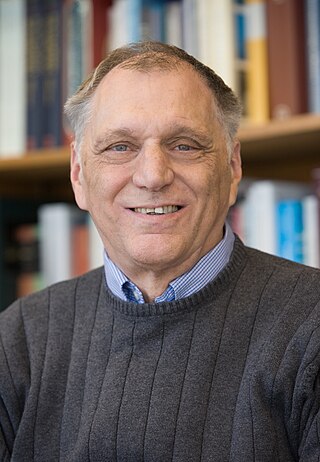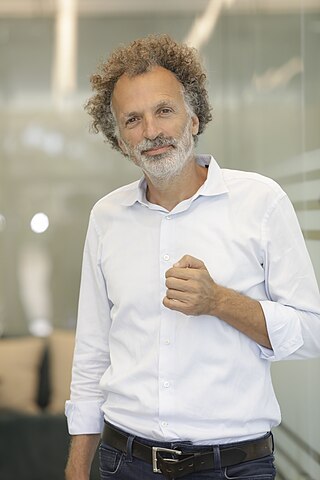Related Research Articles

Cognitive neuroscience is the scientific field that is concerned with the study of the biological processes and aspects that underlie cognition, with a specific focus on the neural connections in the brain which are involved in mental processes. It addresses the questions of how cognitive activities are affected or controlled by neural circuits in the brain. Cognitive neuroscience is a branch of both neuroscience and psychology, overlapping with disciplines such as behavioral neuroscience, cognitive psychology, physiological psychology and affective neuroscience. Cognitive neuroscience relies upon theories in cognitive science coupled with evidence from neurobiology, and computational modeling.
Semantic memory refers to general world knowledge that humans have accumulated throughout their lives. This general knowledge is intertwined in experience and dependent on culture. New concepts are learned by applying knowledge learned from things in the past.
Episodic memory is the memory of everyday events that can be explicitly stated or conjured. It is the collection of past personal experiences that occurred at particular times and places; for example, the party on one's 7th birthday. Along with semantic memory, it comprises the category of explicit memory, one of the two major divisions of long-term memory.

The Seven Sins of Memory: How the Mind Forgets and Remembers is a book by Daniel Schacter, former chair of Harvard University's Psychology Department and a leading memory researcher.
Endel Tulving was an Estonian-born Canadian experimental psychologist and cognitive neuroscientist. In his research on human memory he proposed the distinction between semantic and episodic memory. Tulving was a professor at the University of Toronto. He joined the Rotman Research Institute at Baycrest Health Sciences in 1992 as the first Anne and Max Tanenbaum Chair in Cognitive Neuroscience and remained there until his retirement in 2010. In 2006, he was named an Officer of the Order of Canada (OC), Canada's highest civilian honour.
Explicit memory is one of the two main types of long-term human memory, the other of which is implicit memory. Explicit memory is the conscious, intentional recollection of factual information, previous experiences, and concepts. This type of memory is dependent upon three processes: acquisition, consolidation, and retrieval.

Michael I. Posner is an American psychologist who is a researcher in the field of attention, and the editor of numerous cognitive and neuroscience compilations. He is emeritus professor of psychology at the University of Oregon, and an adjunct professor at the Weill Medical College in New York. A Review of General Psychology survey, published in 2002, ranked Posner as the 56th most cited psychologist of the 20th century.

Mahzarin Rustum Banaji FBA is an American psychologist of Indian origin at Harvard University, known for her work popularizing the concept of implicit bias in regard to race, gender, sexual orientation, and other factors.
Daniel Merton Wegner was an American social psychologist. He was a professor of psychology at Harvard University and a fellow of both the American Association for the Advancement of Science and the American Academy of Arts and Sciences. He was known for applying experimental psychology to the topics of mental control and conscious will, and for originating the study of transactive memory and action identification. In The Illusion of Conscious Will and other works, he argued that the human sense of free will is an illusion.
Priming is a concept in psychology to describe how exposure to one stimulus may influence a response to a subsequent stimulus, without conscious guidance or intention. The priming effect is the positive or negative effect of a rapidly presented stimulus on the processing of a second stimulus that appears shortly after. Generally speaking, the generation of priming effect depends on the existence of some positive or negative relationship between priming and target stimuli. For example, the word nurse might be recognized more quickly following the word doctor than following the word bread. Priming can be perceptual, associative, repetitive, positive, negative, affective, semantic, or conceptual. Priming effects involve word recognition, semantic processing, attention, unconscious processing, and many other issues, and are related to differences in various writing systems. How quickly this effect occurs is contested; some researchers claim that priming effects are almost instantaneous.
In psychology, implicit memory is one of the two main types of long-term human memory. It is acquired and used unconsciously, and can affect thoughts and behaviours. One of its most common forms is procedural memory, which allows people to perform certain tasks without conscious awareness of these previous experiences; for example, remembering how to tie one's shoes or ride a bicycle without consciously thinking about those activities.
Amnesia is a deficit in memory caused by brain damage or brain diseases, but it can also be temporarily caused by the use of various sedative and hypnotic drugs. The memory can be either wholly or partially lost due to the extent of damage that is caused.

Larry Ryan Squire is an American psychiatrist and neuroscientist. He is a professor of psychiatry, neurosciences, and psychology at the University of California, San Diego, and a Senior Research Career Scientist at the Veterans Affairs Medical Center, San Diego. He is a leading investigator of the neurological bases of memory, which he studies using animal models and human patients with memory impairment.
In psychology, mental time travel is the capacity to mentally reconstruct personal events from the past as well as to imagine possible scenarios in the future. The term was coined by Thomas Suddendorf and Michael Corballis, building on Endel Tulving's work on episodic memory.

Moshe Bar is an Israeli cognitive neuroscientist. He is a professor at Bar-Ilan University. He was previously head of the Gonda Multidisciplinary Brain Research Center at Bar-Ilan University and before that director of the Cognitive Neuroscience Laboratory at Harvard Medical School and Massachusetts General Hospital.
Autonoetic consciousness is the human ability to mentally place oneself in the past and future or in counterfactual situations, and to thus be able to examine one's own thoughts.

Memory is the faculty of the mind by which data or information is encoded, stored, and retrieved when needed. It is the retention of information over time for the purpose of influencing future action. If past events could not be remembered, it would be impossible for language, relationships, or personal identity to develop. Memory loss is usually described as forgetfulness or amnesia.
Randy L. Buckner is an American neuroscientist and psychologist whose research focuses on understanding how large-scale brain circuits support mental function and how dysfunction arises in illness.

The Department of Psychology at Harvard University is an academic department in Cambridge, Massachusetts, United States, that is part of the Harvard Faculty of Arts and Sciences. This department offers Bachelor's, Master's and Doctorate degrees in Psychology. Current research at the department focuses on clinical, cognitive, developmental, and social psychology. Notable psychologists that have been affiliated with the department include William James, B. F. Skinner, Gordon Allport, Jerome Bruner, George Miller, and Henry Murray, among others included. The department ranks as one of the top psychology departments in the United States and the world.
Donna Rose Addis is a New Zealand psychology academic. Of Samoan descent, she is currently a full professor at the University of Auckland, but is set to move to the University of Toronto.
References
- ↑ "Professorships & Endowments". WILLIAM R. KENAN, JR. CHARITABLE TRUST. Retrieved 2023-09-18.
- ↑ "Daniel Schacter". scholar.harvard.edu. Retrieved 2023-09-18.
- ↑ "Daniel L. Schacter". psychology.fas.harvard.edu. Retrieved 2023-09-18.
- ↑ Robin Lindley. "How Memory Works: Interview with Psychologist Daniel L. Schacter". History News Network. Archived from the original on September 7, 2013.
- ↑ "The seven sins of memory". apa.org.
- ↑ Taylor Beck (August 16, 2012). "Making sense of memory". Harvard Gazette. Archived from the original on September 23, 2013. Retrieved June 13, 2014.
- ↑ "Psychology, 6th Edition | Macmillan Learning US". www.macmillanlearning.com. Retrieved 2023-09-18.
- ↑ "Introducing Psychology 6th Edition | Daniel Schacter | Macmillan Learning". store.macmillanlearning.com. Retrieved 2023-09-18.
- ↑ "Book of Members, 1780-2010: Chapter S" (PDF). American Academy of Arts and Sciences . Retrieved April 10, 2011.
- ↑ "NAS Award for Scientific Reviewing". National Academy of Sciences. Archived from the original on January 26, 2013. Retrieved February 27, 2011.
- ↑ "Psychologists elected to National Academy of Sciences and American Academy of Arts & Sciences". American Psychological Association . Retrieved December 8, 2015.